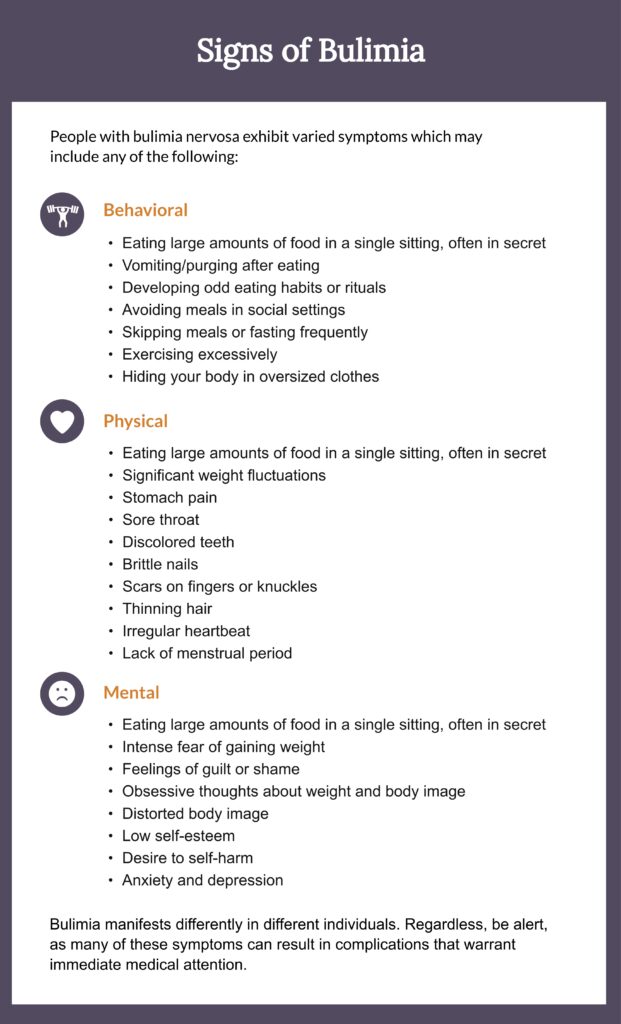By Mandy Parsons
What Is Bulimia?
The National Eating Disorders Association (NEDA) reports that between 1.1% and 4.6% of females and 0.1% to 0.5% of males will develop bulimia in their lifetime.
Bulimia, also known as bulimia nervosa, is a potentially life-threatening eating disorder characterized by a cycle of bingeing and purging food.
What is bulimia? Bulimia, also known as bulimia nervosa, is a potentially life-threatening eating disorder characterized by a cycle of bingeing and purging food.
Someone with bulimia eats excessive amounts of food in secret, only to take laxatives, weight loss supplements, induce vomiting, or overexercise to rid their body of the unwanted calories later.
This vicious pattern wreaks havoc on your system and can cause serious issues like dehydration, heart problems, tooth decay, and digestive disruptions. Bulimia’s effect on mental health is equally concerning.
So, what causes bulimia? What are the signs of bulimia, and how can you help someone who is battling this condition?
Bulimia: Causes, Types, and Diagnostic Criteria
Although bulimia affects women more than men, its exact cause is unknown. Experts speculate diverse factors play a role, including genetics, developmental triggers, traumatic events, mental health, and societal pressures.
Mayo Clinic suggests that people with first-degree relatives who have an eating disorder may be more prone to developing one themself. Depression, anxiety, and substance abuse are linked to eating disorders as well. Preoccupation with diet culture or unrealistic beauty standards might also put you at risk.
According to Johns Hopkins Medicine, bulimia can be categorized into two types: purging and non-purging. Both types restrict calories but in different ways: one by vomiting or use of diuretics and laxatives, the other by fasting or intense exercise to prevent weight gain.
The Diagnostic and Statistical Manual of Mental Disorders, Fifth Edition (DSM-5), has established the subsequent diagnostic criteria for bulimia:
- Recurrent episodes of binge eating (NEDA characterizes an episode as eating within a two-hour period more than most people would consume in that same amount of time under similar circumstances. During these episodes, you feel out of control or unable to stop eating.)
- Recurrent inappropriate compensatory behaviors in order to prevent weight gain
- Binge eating episodes and compensatory behaviors occurring at least once a week, on average, for three months
- Self-evaluation unjustifiably influenced by body shape and weight
- Disturbance not occurring exclusively during episodes of anorexia nervosa
The disorder is rated by severity and frequency of symptoms, with one to three weekly episodes considered “mild,” and “extreme” cases constituting 14 or more episodes a week.
There are warning signs that someone should seek a clinical diagnosis for bulimia. Recognizing these red flags early on is crucial to successful treatment and recovery.

Complications of Bulimia
Binging and purging is a dangerous cycle that can have long-lasting health implications, many of which are fatal if not treated.
NEDA warns that recurrent binge-and-purge episodes can result in serious electrolyte and chemical imbalances that impact major organ functions. Electrolyte imbalances are often the culprit of heart failure, seizures, and kidney malfunction.
Bulimia messes with our digestive and endocrine systems as well. People with bulimia are at risk of gastric perforation, esophageal rupture, pancreatitis, and intestinal obstruction. Women may experience a drop in hormones and menstrual or fertility issues.
Bulimia is a mental disorder, and those impacted not only struggle with negative thoughts about their body but also feelings of shame and guilt over their actions.
Other health consequences range from facial swelling and tooth decay to anemia and even cathartic colon syndrome (from laxative abuse). But bulimia doesn’t just ravage the body, it takes a significant toll on the mind and emotions too.
Bulimia is a mental disorder, and those impacted not only struggle with negative thoughts about their body but also feelings of shame and guilt over their actions. This affects their social functioning, and some withdraw from relationships or activities.
Consequently, the condition is linked to depression, anxiety, and personality disorders. Individuals with bulimia may misuse drugs or alcohol in an effort to cope.
How to Help Someone with Bulimia
If you suspect that someone you love is fighting bulimia, initiate an open conversation and express your concern. Urge them to seek professional help immediately, as it could be a matter of life and death.
Bad habits are hard to break. The longer someone engages in bulimic behavior, the tougher it is to overcome. Although you can’t force anyone to get treatment, you can encourage them and offer to help in the process.
At The Meadows Ranch, we have a proven track record of helping women and young girls with bulimia, anorexia, binge eating disorder, and other eating disorders. We not only focus on the treatment of eating disorders but the underlying causes and related trauma.
Please don’t hesitate to contact us today. Recovery is possible, and we would be honored to partner in yours.

